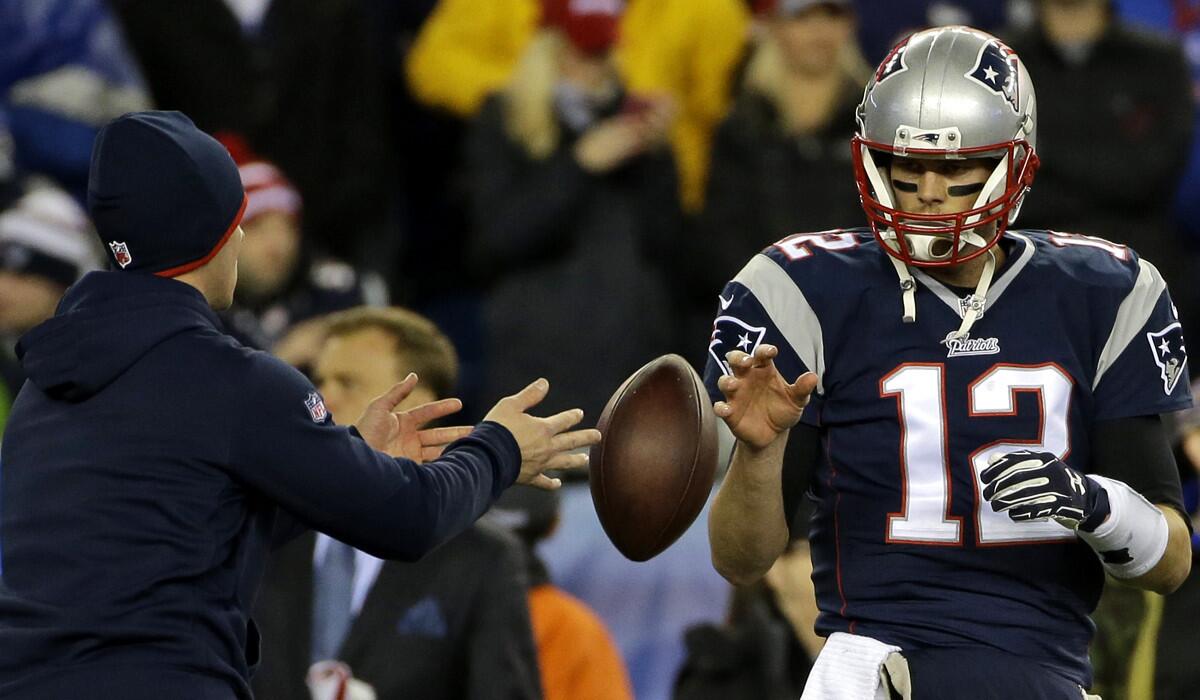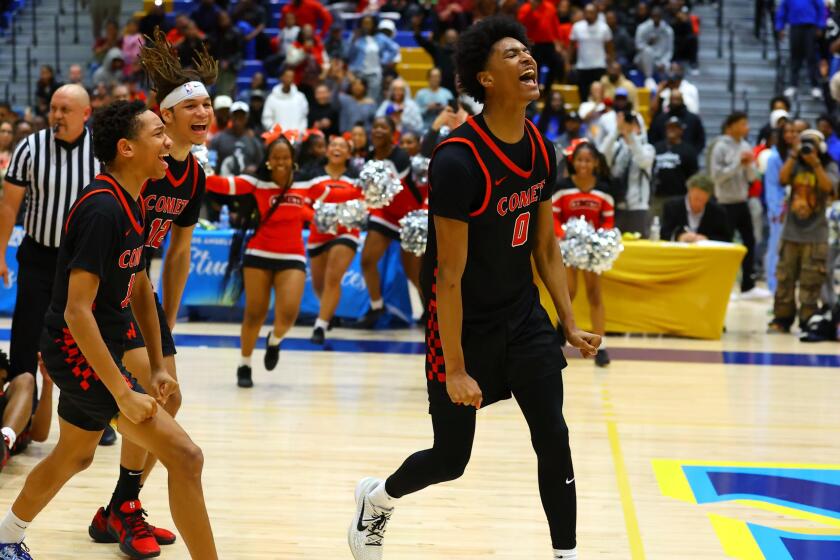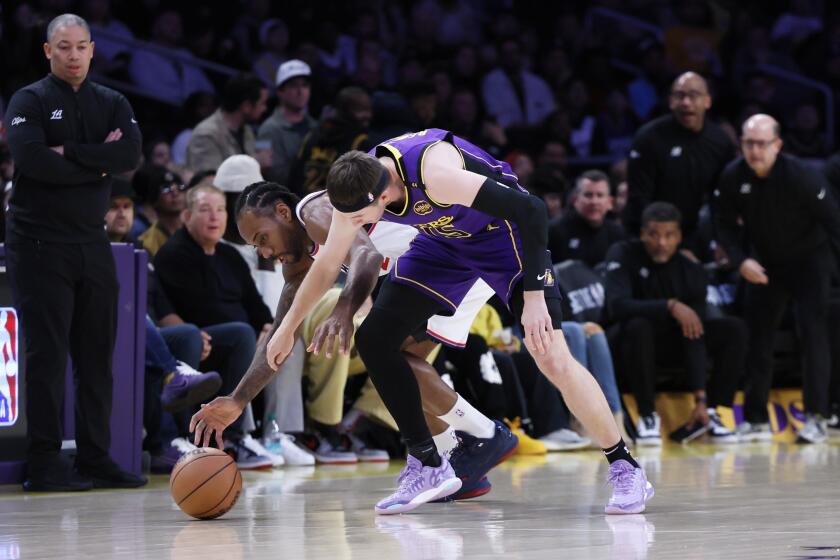Patriots, Bill Belichick at the center of ‘Deflategate’

- Share via
Bill Belichick’s news conferences are legendary. The New England Patriots coach is comically unwilling to offer a hint of useful information.
His clipped responses come in mumbles and unenthusiastic shrugs, particularly after games. He is as bland and unrevealing as the charcoal hoodie that shrouds him on the sideline.
You can get away with such a taciturn personality if you win, and that’s something Belichick has done a lot. He has five Super Bowl rings, three as a head coach. His team is headed back to the Super Bowl on Feb. 1 and will face the Seattle Seahawks.
Belichick was named the NFL coach of the year after the 2003, 2007 and 2010 seasons. He’s among the most successful coaches in NFL history — and the most polarizing.
The Patriots were favored to beat the Indianapolis Colts in Sunday’s AFC championship game on New England’s home field and rolled to a 45-7 victory. Now they — and Belichick — are accused of breaking the rules by underinflating their footballs to gain a competitive edge.
Softer footballs are easier to throw and catch, especially in wet weather. It rained and temperatures were in the low 50s at Gillette Stadium in Foxborough, Mass., for Sunday’s game.
Belichick’s detractors see him as someone who will do anything to win. Hall of Fame coach Don Shula recently referred to him as “Belicheat.”
This latest scandal comes seven years after the NFL disciplined the Patriots for the improper videotaping of the sideline hand signals of New York Jets coaches.
According to an ESPN report Tuesday, the league checked the air pressure of New England’s footballs at halftime and found that 11 of 12 were underinflated by about two pounds per square inch. NFL rules stipulate that balls be inflated to a pressure of between 12 1/2 and 13 1/2 pounds per square inch.
The issue surfaced when a Colts linebacker intercepted a pass thrown by quarterback Tom Brady late in the second quarter. The Colts player noticed the ball was underinflated and alerted a member of the Indianapolis equipment staff. Word eventually reached a league executive in the press box, who instructed that the Patriots’ footballs be tested.
The NFL has not commented on the situation, or released details of its investigation.
Each team provided game officials with 12 footballs, in keeping with standard practice. A referee checked all the balls’ air pressure two hours and 15 minutes before kickoff. The balls were then marked with a rubber stamp to prevent them from being switched. Twelve other footballs were set aside for use by kickers and punters on both teams.
It’s not known whether the dozen footballs the Colts had in their possession were tested at halftime. If they were, the NFL should be able to determine if the Colts had deflated their footballs as well, or if weather conditions had affected the air pressure in both teams’ footballs.
Though some people dismiss the notion of playing with softer footballs as trivial, the accusation comes at a time when the integrity of the NFL has come under attack. The league has just endured its most turbulent season, with the spotlight focused on the mishandling of the domestic violence cases of star running backs Ray Rice and Adrian Peterson.
Transgressions involving Belichick’s Patriots have become part of the lexicon of sports. The hand-signal controversy was known as “Spygate” and this latest has been dubbed “Deflategate.”
After Spygate, the NFL fined Belichick $500,000, the maximum allowable under league rules, and stripped New England of a first-round draft pick.
The Patriots were also involved in two plays that were hotly debated around the league.
There was the infamous “tuck rule” decision in a January 2002 divisional playoff game between the Patriots and Oakland Raiders. Officials waved off an apparent fumble by Brady and ruled that he was trying to tuck the ball away after a pump fake and that his was an incomplete pass. It was a pivotal play in New England’s victory. The tuck rule was eliminated from the NFL playbook in 2013.
In a divisional playoff game a week before Deflategate, Baltimore Ravens Coach John Harbaugh accused Belichick of a substitution trick that he said was “clearly deception.” Harbaugh was penalized for unsportsmanlike conduct for running onto the field to protest the alignment.
Brady later defended the strategy and took a swipe at Harbaugh, saying: “Maybe those guys gotta study the rulebook and figure it out. We obviously knew what we were doing and we made some pretty important plays. It was a real good weapon for us.”
In a radio interview three years ago, Brady said he prefers throwing a slightly deflated football.
“When there’s rain and ice and wind, probably deflating it slightly will make it more pliable and make it easier to clinch and therefore not fumble,” said Timothy Gay, physics professor at the University of Nebraska Lincoln, and author of “The Physics of Football.”
Speaking generally, and not in relation to the New England situation, Gay said: “These guys want every single marginal advantage they can get. They’re looking for every single little thing.”
The problem of deflated footballs isn’t exclusive to the NFL. In 2012, the Pac-12 Conference fined USC $25,000 after the Trojans used deflated footballs in a 62-51 loss to Oregon at the Coliseum.
Quarterback Matt Barkley passed for 484 yards and five touchdowns in the game. USC said an unidentified student manager was responsible and relieved him of his duties.
Brady isn’t the only NFL quarterback who looked for an edge. Former Buccaneers quarterback Brad Johnson admitted Wednesday in the Tampa Bay Times that in 2003, he paid someone $7,500 to make sure the game footballs were scuffed to his liking before playing Oakland in the Super Bowl. Johnson’s team won.
During the run-up to the Super Bowl next week, the topic of deflated footballs probably will resurface in virtually all interviews with Patriots players and coaches. Former Patriots tight end Christian Fauria believes the story is already overblown.
“I’m sure he regrets some of the things he’s done in the past, and if he had the chance to do them over again I’m sure he would,” Fauria said of Belichick. “But don’t give me this win-at-all-costs stuff. Most of these head coaches in the NFL have beds in their offices. Most of these assistant coaches don’t see their families, ever. You have to love what you do, you have to be driven, and you have to be competitive.
“Show me a coach who isn’t competitive in the NFL, and I’ll show you a coach who isn’t in the NFL anymore.”
Times staff writers Nathan Fenno and Gary Klein contributed to this report.
More to Read
Go beyond the scoreboard
Get the latest on L.A.'s teams in the daily Sports Report newsletter.
You may occasionally receive promotional content from the Los Angeles Times.











